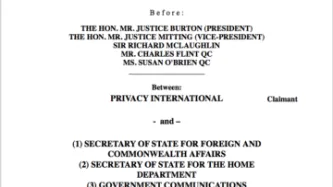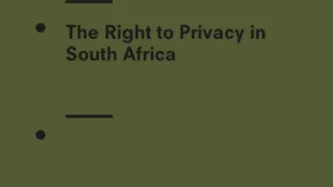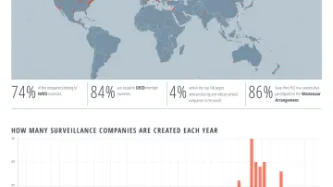Advanced Search
Content Type: Advocacy
This week, from 17th-20th October 2016, the Kingdom of Morocco will be hosting the 38th International Conference of Data Protection and Privacy Commissioners (ICDPPC).
And two scenarios could play out…
Scenario one — like many other occasions, this will be used as wonderfully strategic PR stunt, whereby participants will be whisked directly from the airport to their hotel to the conference venue, and will be enchanted by the genuinely warm Moroccan hospitality. But they will leave…
Content Type: Press release
Key points
Bulk Communications Data (BCD) collection, commenced in March 1998, unlawful until November 2015
Bulk Personal Datasets regime (BPD), commenced c.2006, unlawful until March 2015
Everyone’s communications data collected unlawfully, in secret and without adequate safeguards until November 2015
We maintain that even post 2015, bulk surveillance powers are not lawful
As the Investigatory Powers Bill is set to become law within weeks, we argue that the authorisation and…
Content Type: Long Read
On 17 October 2016, the Investigatory Powers Tribunal handed down judgment in a case brought by Privacy International against the Foreign Secretary, the Home Secretary and the three Security and Intelligence Agencies (MI5, MI6 and GCHQ).
The case concerned the Agencies’ acquisition and use of bulk personal datasets (‘BPD’) – datasets that contain personal data about individuals, the majority of whom are unlikely to be of intelligence interest, such as passport databases and finance-related…
Content Type: Press release
This week in Geneva, the UN Human Rights Committee will examine Colombia’s compliance with the International Covenant on Civil and Political Rights (ICCPR). This review, by a body of independent experts charged with monitoring compliance with the ICCPR, comes just weeks after the peace deal between President Juan Manuel Santos and Farc leader Timoleon Jimenez was rejected by voters and months after it was revealed that an investigative journalist was put under surveillance by the Colombian…
Content Type: News & Analysis
As of October 1st, it has become impossible for the public to see footage from North Carolina police body cameras as a result of new law HB 972. This should be of concern to anyone who cares about police accountability and the balance of power in the new digital surveillance era. Increasingly, we are seeing law enforcement use new technology to respond not only to unrest and crime but also to collect and monitor data about individuals who are not suspected of any criminal involvement, such as…
Content Type: Advocacy
This stakeholder report is a submission by Privacy International (PI) and the Right2Know Campaign (R2K). This report has been prepared with the assistance and research done by the Media Policy and Democracy Project. PI is a human rights organisation that works to advance and promote the right to privacy and fight surveillance around the world. R2K is a broad- based, grassroots campaign formed to champion and defend information rights and promote the free flow of information in South Africa…
Content Type: Advocacy
This stakeholder report is a submission by Centre for Internet and Society India (CIS India) and Privacy International (PI). CIS is a non-profit organisation that undertakes interdisciplinary research on internet and digital technologies from policy and academic perspectives. Through its diverse initiatives, CIS explores, intervenes in, and advances contemporary discourse and practices around internet, technology and society in India, and elsewhere. PI is a human rights organisation that…
Content Type: Long Read
This week, Privacy International, together with nine other international human rights NGOs, filed submissions with the European Court of Human Rights. Our case challenges the UK government’s bulk interception of internet traffic transiting fiber optic cables landing in the UK and its access to information similarly intercepted in bulk by the US government, which were revealed by the Snowden disclosures. To accompany our filing, we have produced two infographics to illustrate the…
Content Type: Press release
PI Research Officer Edin Omanovic said:
“The European Commission has proposed sweeping updates [PDF] to trade regulations in an effort to modernise the EU’s export control system and to ensure that the trade in surveillance technology does not facilitate human rights abuses or internal repression.
Privacy International welcomes the intentions of the proposed changes in terms of protecting human rights as it does all such moves. More than half of the world’s surveillance…
Content Type: Press release
Key points
Privacy International, Liberty, Amnesty International, and seven other human rights organizations challenge UK mass surveillance and UK access to US mass surveillance at the European Court of Human Rights
This is the first case before the European Court of Human Rights to directly challenge UK and US mass surveillance revealed by the Snowden disclosures
National courts and oversight bodies have failed to rein in mass surveillance practices that impact hundreds of millions of…
Content Type: Long Read
This report examines the emergence of social media based surveillance in Thailand, carried out potentially by people’s own networks of friends and family. It looks at the severe impact this has on personal privacy and points to potential solutions.
In May 2014, Thailand experienced a military coup – its second in eight years. A military government led by General Prayut Chan-o-cha seized power and overthrew the administration of Prime Minister Yingluck Shinawatra. The Army declared martial…
Content Type: Press release
Caroline Wilson Palow, General Counsel, Privacy International said:
“David Anderson QC’s report raises more questions than it answers.
Anderson has not assessed the proportionality of the bulk powers he reviewed. Ultimately, the proportionality question is the crucial one. Would the public find these kind of powers acceptable in a democratic society given their potential to vastly intrude into our privacy? Mere usefulness cannot be and is not the legal test for whether bulk powers should be…
Content Type: Press release
Today, Privacy International, together with five internet and communications providers from around the world, have lodged an application before the European Court of Human Rights to challenge the British Government's use of bulk hacking abroad. Until we brought our original case at the Investigatory Powers Tribunal (IPT) in 2014, the Government had never admitted that it engaged in hacking. Now we are learning for the first time how far-reaching the Government's global hacking capabilities are…
Content Type: Long Read
Often when asked to discuss open data and privacy the objective is to successfully navigate the tension between the fundamental right to privacy, and the virtues of open data. And there is a tension. It is rare to see increased collection of data alongside greater privacy protections. The recently released Surveillance Industry Index (SII) is one of those rarities.
The SII, a joint initiative between Privacy International and Transparency Toolkit, is the largest…
Content Type: Press release
New report entitled Global Surveillance Industry maps out growth and scale of global surveillance industry
Privacy International, in collaboration with Transparency Toolkit, launches searchable database featuring over 1500 brochures and data on over 520 surveillance companies as well as over 600 reported individual exports of specific surveillance technologies taken from open source records, including investigative and technical reports, as well as government export licensing data
The…
Content Type: Report
The report “The Global Surveillance Industry" charts the development of the industry since the earliest reports in the 70s that wiretapping equipment was being exported by Western countries and used by authoritarian regimes. It provides an accessible introduction into the types of the technologies currently on offer, and uses a combination of export data, company data and analysis of surveillance technologies to assess the current industry. The report presents an analysis of the…
Content Type: News & Analysis
Privacy International is today proud to release the Surveillance Industry Index (SII), the world's largest publicly available educational resource of data and documents of its kind on the surveillance industry, and an accompanying report charting the growth of the industry and its current reach.
The SII, which is based on data collected by journalists, activists, and researchers across the world is the product of months of collaboration between Transparency Toolkit and Privacy…
Content Type: News & Analysis
Privacy can be seen as a reflex of innovation. One of the seminal pieces on the right to privacy as the 'right to be let alone emerged in response to the camera and its use by the tabloid media. Seminal jurisprudence is in response to new surveillance innovations... though often with significant delays.
While one approach would be to say that privacy is a norm and that with modern technologies the norm must be reconsidered and if necessary, abandoned; I think there’s an interesting idea around…
Content Type: Long Read
Privacy International’s case on Bulk Personal Datasets and Bulk Communications Data comes to a head with a four-day hearing in the Investigatory Powers Tribunal which commenced on 26 July 2016.
The litigation has brought to light significant revelations about the use of section 94 of the 1984 Telecommunications Act to obtain bulk communications data.
Large amounts of disclosure have shed new light on this hitherto secret power and explained confusing aspects of the Government’s Response to…
Content Type: Legal Case Files
Section A: RFI 1 to RFI 11
Section B: 1. GCHQ compliance Guide extracts to 28. SIS Database
Content Type: Legal Case Files
All Intelligence Services: 1 to 2
GCHQ: 3 to 11
Security Service: 12 to 32
Secret Intelligence Service: 33 to 46
Content Type: Legal Case Files
Section A: RFI 33 to Direction from the PM to the Intelligence Services Commissioner
Section B: RFI 3 to Arrangements for the Acquisition of Bulk Communications Data - 4 November 2011
Section C: Table of Gists to Extracts from Confidential Annex to Intelligence Service Commissioner's Report - 2010
Please note that Section C labels for documents does not completely align so some parts of the document will be in the previous document and some might extend to the following document.
Content Type: Legal Case Files
Part 1: RFI 12 to RFI 32
Part 2: Historic 4 to Exhibit D
Part 3: RFI 1 to 2004 Correspondence Home Office / Swinton Thomas
Content Type: Legal Case Files
Privacy International in August 2014 filed a legal challenge in the Investigatory Powers Tribunal. Detailed grounds were filed on 10 September 2015 and re-amended on 8 January 2016 following disclosures regarding the use of section 94 of the Telecommunications Act 1984 to include a challenge to the use of section 94 of the Telecommunications Act.
The Respondents provided an amended response on 19 February 2016 which provides detail on the use of section 94 and…
Content Type: Press release
Privacy International General Counsel Caroline Wilson Palow said
"Today's opinion issued by the Advocate General of the European Court of Justice (ECJ) is a serious blow to the UK's Investigatory Powers Bill (IPBill). It, hopefully, presages a strong judgment from the Court itself.
The bulk powers - what we would call mass surveillance powers - embedded throughout the IPBill go far beyond tackling serious crime. They would give a range of public bodies, not just the Police and…
Content Type: Advocacy
After the adoption of the EU General Data Protection Regulation, the Data Protection Directive for Law Enforcement Agencies, the EU-US Privacy Shield, your understandable EU privacy policy fatigue is excused.
But when a coalition of tech and telecom industries calls for a relatively obscure EU directive to be repealed, it may unintentionally trigger an atypical Streisand effect: if companies, which often so cavalier to individuals’ privacy, want to get rid of the EU e-privacy…
Content Type: News & Analysis
One of the most controversial aspects of the UK's Investigatory Powers Bill proposes the storing by ISPs and mobile network providers of 'Internet Connection Records' (ICRs). While vaguely defined, they will include your internet browsing history (although the Government is at pains to clarify that only the websites you visit, not the specific webpages on those websites will be stored), and what apps you have accessed, over the previous 12 months.
Clearly then ICRs are personal…
Content Type: News & Analysis
After the adoption of the EU General Data Protection Regulation, the Data Protection Directive for Law Enforcement Agencies, the EU-US Privacy Shield, your understandable EU privacy policy fatigue is excused.
But when a coalition of tech and telecom industries calls for a relatively obscure EU directive to be repealed, it may unintentionally trigger an atypical Streisand effect: if companies, which often so cavalier to individuals’ privacy, want to get rid of the EU e-privacy…
Content Type: Press release
A new Twitter Bot, launched today by the global privacy rights organisation Privacy International, ‘reveals’ the internet browsing history of leading politicians, as well as details of their telephone, text message, WhatsApp, and even Snapchat communications. @GCHQbot has been launched to raise the profile of the sensitivity of our internet browsing history and communications data, on the day that the Investigatory Powers Bill begins its Committee Stage in the House of Lords.
Bot: …
Content Type: News & Analysis
The reports of Universal Periodic Review (UPR) Working Group for the States under Review at the 24th session in January 2016 were adopted during the last Regular Session of the Human Rights Council, which took place from 13 June to 1 July 2016.
Of the 14 Member States being reviewed, Privacy International with co-submitters presented reports on the right to privacy in Denmark, Paraguay, Belgium, Estonia, Namibia, and Singapore.
The growing number of…

















